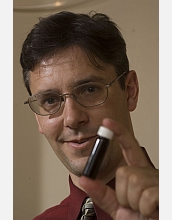All Images


Press Release 08-056
Money Doesn't Grow on Trees, But Gasoline Might

Researchers make breakthrough in creating gasoline from plant matter, with almost no carbon footprint
Back to article | Note about images
 |
George Huber poses with a vial of green gasoline compounds.
Credit: Ben Barnhart |
Download the high-resolution JPG version of the image. (256 KB)
|
Use your mouse to right-click (Mac users may need to Ctrl-click) the link above and choose the option that will save the file or target to your computer.
|
 |
 View Video View Video
John Regalbuto, program director for Catalysis and Biocatalysis in NSF's Division of Chemical, Biochemical and Biotechnology Systems, describes green gasoline and provides context for its potential role as an alternative energy.
Credit: National Science Foundation
|
 |
James Dumesic of the University of Wisconsin-Madison and his former student George Huber, now at the University of Massachusetts-Amherst, are breaking new ground in the development of an alternative fuel called "green gasoline."
Credit: University of Wisconsin-Madison |
Download the high-resolution JPG version of the image. (68 KB)
|
Use your mouse to right-click (Mac users may need to Ctrl-click) the link above and choose the option that will save the file or target to your computer.
|
 |
George Huber poses in the laboratory with, from left to right, Hakan Olcay and Tushar Vispute, two of his graduate students.
Credit: Ben Barnhart |
Download the high-resolution JPG version of the image. (11.6 MB)
|
Use your mouse to right-click (Mac users may need to Ctrl-click) the link above and choose the option that will save the file or target to your computer.
|
 |
Components for green gasoline can be sythesized in a laboratory from agricultural waste. New processes are breaking the barriers to producing green gasoline on the large scale needed for industrial produciton.
Credit: Ben Barnhart |
Download the high-resolution JPG version of the image. (310 KB)
|
Use your mouse to right-click (Mac users may need to Ctrl-click) the link above and choose the option that will save the file or target to your computer.
|
 |
In a report sponsored by the National Science Foundation, the Department of Energy and the American Chemical Society entitled Breaking the Chemical and Engineering Barriers to Lignocellulosic Biofuels: Next Generation Hydrocarbon Biorefineries, released April 1 (http://www.ecs.umass.edu/biofuels/), Huber and a host of leaders from academia, industry and the government present a plan for making green gasoline a practical solution for the impending fuel crisis.
Credit: NSF, DOE, ACS |
Download the high-resolution JPG version of the image. (359 KB)
|
Use your mouse to right-click (Mac users may need to Ctrl-click) the link above and choose the option that will save the file or target to your computer.
|
|







